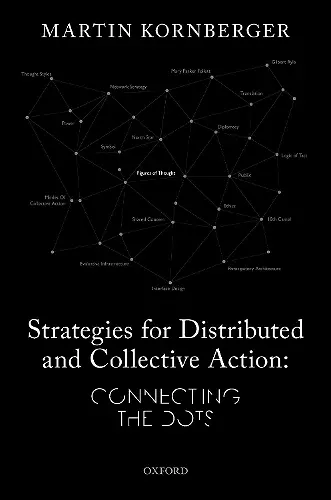Strategies for Distributed and Collective Action
Connecting the Dots
Format:Hardback
Publisher:Oxford University Press
Published:6th Jan '22
Currently unavailable, and unfortunately no date known when it will be back

How do we organize ourselves to accomplish shared goals? Our well-worn modes of collective action--from markets to hierarchies, from institutions to movements--have so far provided a limited vocabulary to investigate, let alone invent, new forms of open, networked, and trans-sectoral collaboration. Yet new forms of collective action are continually emerging, defined by openness, polycentricity, and plurality while still strategic and goal-oriented. Martin Kornberger pursues these experimental models to offer a vocabulary for the hitherto "untapped capability" to organize and strategize distributed and collective action. He introduces a novel set of concepts including shared concerns, symbols, interface designs, participatory architectures, evaluative infrastructures, network strategy, and leading as diplomacy, which together combine goal-orientated, purposeful action with scale, openness, and creativity. With a new vocabulary we can explore alternative ways of thinking and strategies to address the significant challenges and crises of our times.
Kornberger dives more deeply into the foundational assumptions and epistemologies of different theoretical traditions, reanimating long familiar arguments for seasoned readers and inviting graduate students to engage critically with classic texts and novel social phenomena. Each wave of theorizing about organization was grounded in the experience of specific episodes of sweeping social change or organizational innovation. * Elisabeth S. Clemens, Administrative Science Quarterly *
It covers examples ranging from responses to COVID-19 to the refugee crisis and provides a sophisticated theoretical overview of the roles of markets and crowds, movements and teams, fusing philosophy and social science. At its core are examples that show how traditional models of collective organization (markets, hierarchies, organisations) are now being complemented by new methods enabled by digital networks. * Geoff Mulgan, Collective Intelligence *
A fascinating look at new models of distributed collective action. It's rich in philosophical reflection and thoughtful observation of recent phenomena, from the refugee crisis to COVID, and links these to a sophisticated theoretical understanding of markets and crowds, movements and teams. I've no doubt that the territory which it covers will be part of the common sense of the near future and that this book provides vital insights into how intelligence can be orchestrated at larger scales. * Professor Sir Geoff Mulgan, UCL *
It seems that the world is in the permanent state of crisis; how can collective actions be organized in such a state? By investing in openness, polycentricity, and plurality, answers Martin Kornberger in his book that offers a deeply impressive combination of philosophy, old and new organization theory, political economy, and sociological reflection. I can imagine both Mary Parker Follett and Albert Hirschman applauding! This is a text that ought to be read by students of all social sciences, and of humanities as well. * Barbara Czarniawska, Senior Professor of Management Studies, FBA *
This book brims with fresh ideas for understanding collective action and deftly recombines older, received modes of thought. Kornberger is an exciting thinker, and a hopeful one, too. Both are in short supply at the moment; this most welcome book will lift minds and spirits. * Woody Powell, Stanford University *
How do collectives get things done? For generations we have looked to markets, hierarchies, institutions, and movements to explain collective action, but today new forms are emerging in surprising places, often enabled by new technologies. In this lively and delightfully readable book, Martin Kornberger inventories existing forms and provides a vocabulary for thinking about and designing new methods of coordination that can help guide our emerging future. * Jerry Davis, Gilbert & Ruth Whitaker Professor of Management and Professor of Sociology, Ross School of Business, University of Michigan *
...extremely interesting. * Caleb Bernacchio, Philosophy of Management *
Strategies for Distributed and Collective Action shares many features of Gareth Morgan's well-known Images of Organization (1997), as it reminds us of the power of basic theoretical imageries anchored by vivid examples. But Kornberger dives more deeply into the foundational assumptions and epistemologies of different theoretical traditions, reanimating long-familiar arguments for seasoned readers and inviting graduate students to engage critically with classic texts and novel social phenomena. Each wave of theorizing about organization was grounded in the experience of specific episodes of sweeping social change or organizational innovation. * Elisabeth S. Clemens, Administrative Science Quarterly *
ISBN: 9780198864301
Dimensions: 240mm x 163mm x 21mm
Weight: 512g
240 pages